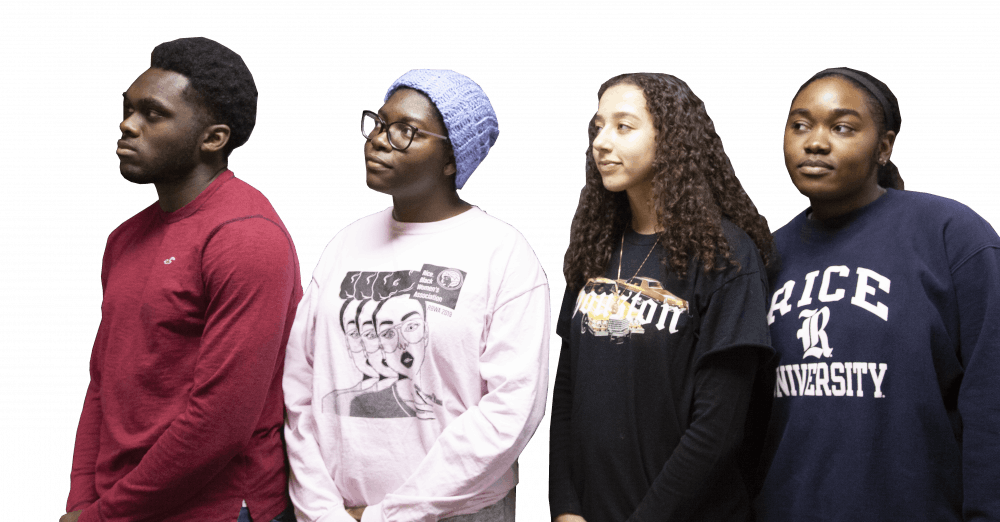The silenced experience at Rice

This op-ed has been a work in progress for a few weeks. There is so much we could write about, given recent events that have occurred at Rice. We have met multiple times to discuss the points we wanted to discuss in this piece, and each of those meetings has felt like a firehose to the face. So many issues surround the Black experience at Rice that we doubt an entire edition of the Rice Thresher could do it justice, never mind a single piece.
However, we make do with an op-ed, one which has already been slightly controversial. There have been people telling us how important this piece is. We’ve also gotten the subtly passive-aggressive “Oh, that’s nice.” But the most popular response we’ve gotten is “Why?” To us, that question provides the answer.
The why is more than anger towards a month-old email from President David Leebron drafted to be as tepid and inoffensive as possible in addressing the recently rediscovered, blatantly racist images of blackface, minstrels and the Ku Klux Klan’s presence on campus in older volumes of the Campanile. This piece is meant to serve as a call to action for administration and students alike to have honest dialogue regarding awareness of Black student issues on campus. From the Martin Luther King Jr. Day Pass on the Thresher’s Backpage last year to a recent incident in which unidentified white people driving a truck tormented Black students with racial slurs on campus, there is a dire need for the Rice community to reevaluate how we celebrate different cultures at Rice.
Even though this year’s Black History Month was marked by the rediscovery of past racist behavior of Rice alumni, this is an opportunity for us to productively discuss race; more specifically, race as it pertains to Black students on this campus. We must start talking about the Black experience and how other students’ actions impact it. Because the percentage of Black people at Rice (7 percent) is nowhere near representative of the U.S. population (14 percent), Rice and its students have a responsibility to make sure that black students feel as valued as any other demographic group on campus. The everyday words and actions of students — making comments about black hairstyles, singing along to racial slurs in popular music, saying things like “I don’t see color” — are microaggressions that contribute to the overwhelming feeling of “otherness” among Black students at Rice. When you then add in the dispersed nature of the residential college system and the fact that a significant percentage of the Black population is comprised of student-athletes, this makes the Rice experience feel much more isolating for Black students.
As a community, we must recognize and correct our actions in order to ensure that residential colleges are safe spaces for Black students. In order to create these safe spaces, we must push for more diversity among faculty on campus and the adult leadership teams in each college. Right now, a pathetically small fraction of the Rice faculty is Black. The Rice experience will always feel isolating for black students if they barely see professors, resident associates or magisters who look like them. Once these safe spaces are created, events such as the Black Experience Panel at Martel College — a grassroots-led event organized by a handful of students — are more likely to become a reality for other colleges. Furthermore, Black students shouldn’t be the only people to attend these events. A misconception on this campus is that it is up to only Black students to participate in Black-centered events. In order to make the Rice experience more fruitful for Black students (and all other students too), we need allies of all races to lean in and engage.
This even extends to the administration in their efforts to address the egregious actions of Rice community members. Moving forward, the administration should reach out to the the Black community — in a town hall or a meeting with Black student leaders — when situations occur that directly affect us. This same protocol should occur for any group of individuals who feels that their existence is undermined. How can the administration speak about an event that has significantly impacted a group of people without asking their thoughts and feelings on the events that occurred? The statement makes suggestions to the Rice community concerning what non-Black students can do to be supportive of the group harmed by this situation. However, to truly help Black students on campus, they should have asked us what we need from non-Black students.
This piece isn’t meant to direct blame towards one group or another, but rather to make people more aware of the proliferation of microaggressions towards Black students. Currently, people aren’t comfortable discussing these topics or issues either with Black students or among themselves. Whether we acknowledge them or not, these problems exist and affect the wellbeing of students and community members. If Rice really champions the phrase “diversity and inclusion,” then as a Rice community, we need to rethink how we go about reflecting these words in the actions, events and conversations we have with one another within our community. It’s not enough to just have people from various backgrounds attend Rice. How we appreciate those backgrounds and experiences matters too.
This op-ed has been updated to reflect the fact that the Black Experience Panel at Martel College was organized by a handful of motivated students, not a pre-existing organization.
More from The Rice Thresher

Jones wins men’s and women’s Beer Bike races, GSA snags alumni
Jones College won both the women’s and men’s Beer Bike 2024 races, while the Graduate Student Association claimed the alumni team win. Hanszen College bike teams were the runner-up in the alumni and men’s races, while Brown College was the runner-up in the women’s race. Martel and McMurtry Colleges did not bike in the alumni race, according to the Rice Program Council’s final report, and the GSA was disqualified from the men’s race for accidentally sending out two bikers simultaneously.

‘Off the beaten track’: Commencement speakers through the years
A former American president, Neil deGrasse Tyson, Nobel laureates and the founder of Khan Academy. All may share similar traits or levels of fame, but there’s another, quieter, common ground: They’ve all spoken at Rice’s commencement.

Rice wraps up Conversations on the Middle East series, looks to fall semester
With the final session rescheduled to Wednesday April 17, the Conversations on the Middle East series is coming to a close.

Please note All comments are eligible for publication by The Rice Thresher.